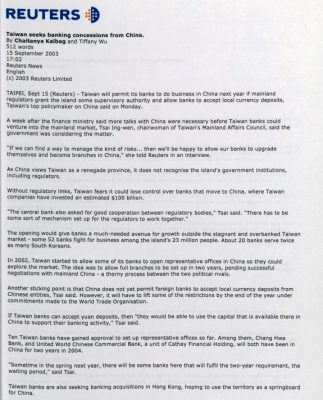Taiwan seeks banking concessions from China
[Reuters]
Published date: 15th Sep 2003
15 September 2003
Reuters News
English
(c) 2003 Reuters Limited
TAIPEI, Sept 15 (Reuters) – Taiwan will permit its banks to do business in China next year if mainland regulators grant the island some supervisory authority and allow banks to accept local currency deposits, Taiwan’s top policymaker on China said on Monday.
A week after the finance ministry said more talks with China were necessary before Taiwan banks could venture into the mainland market, Tsai Ing-wen, chairwoman of Taiwan’s Mainland Affairs Council, said the government was considering the matter.
“If we can find a way to manage the kind of risks … then we’ll be happy to allow our banks to upgrade themselves and become branches in China,” she told Reuters in an interview.
As China views Taiwan as a renegade province, it does not recognise the island’s government institutions, including regulators.
Without regulatory links, Taiwan fears it could lose control over banks that move to China, where Taiwan companies have invested an estimated $100 billion.
“The central bank also asked for good cooperation between regulatory bodies,” Tsal sald. “There has to be some sort of mechanism set up for the regulators to work together.”
The opening would give banks a much-needed avenue for growth outside the stagnant and overbanked Taiwan market – some 52 banks fight for business among the island’s 23 million people. About 20 banks serve twice as many South Koreans.
In 2002, Taiwan started to allow some of its banks to open representative offices in China so they could explore the market. The idea was to allow full branches to be set up in two years, pending successful negotiations with mainland China – a thorny process between the two political rivals.
Another sticking point is that China does not yet permit foreign banks to accept local currency deposits from Chinese entities, Tsai said. However, it will have to lift some of the restrictions by the end of the year under commitments made to the World Trade Organisation.
If Taiwan banks can accept yuan deposits, then “they would be able to use the capital that is available there in China to support their banking activity,” Tsai said.
Ten Taiwan banks have gained approval to set up representative offices so far. Among them, Chang Hwa Bank, and United World Chinese Commercial Bank, a unit of Cathay Financial Holding, will both have been in China for two years in 2004.
“Sometime in the spring next year, there will be some banks here that will fulfil the two-year requirement, the waiting period,” said Tsai.
Taiwan banks are also seeking banking acquisitions in Hong Kong, hoping to use the territory as a springboard for China.
Fubon Financial Holding Co, for example, said last week it would buy International Bank of Asia Ltd to gain a strategic foothold in the greater China market.
Taiwan and China have suspended formal talks since 1999, though trade ties are booming. The island’s businesses have invested an estimated $100 billion in China, a sector that Taiwan banks are desperate to serve.






